The process of aging brings with it a host of psychological and emotional transitions that can significantly impact overall well-being. For many individuals, the golden years are a time of reflection, connection, and personal growth. Yet they can also be shadowed by challenges like loneliness, depression, anxiety, and cognitive decline. As the global population of older adults continues to expand, particularly in aging societies like the United States, the question of how to support their mental health becomes ever more urgent. Fortunately, science increasingly suggests that older adults can improve mental health naturally by adopting specific lifestyle interventions, dietary strategies, social habits, and mind-body practices. The evidence points to a promising conclusion: with informed guidance and consistency, natural approaches can meaningfully bolster mood, sharpen cognition, and enhance quality of life among aging populations.
You may also like: How to Prevent Dementia and Alzheimer’s Disease Naturally: Expert-Backed Strategies to Reduce Your Risk Through Lifestyle and Diet
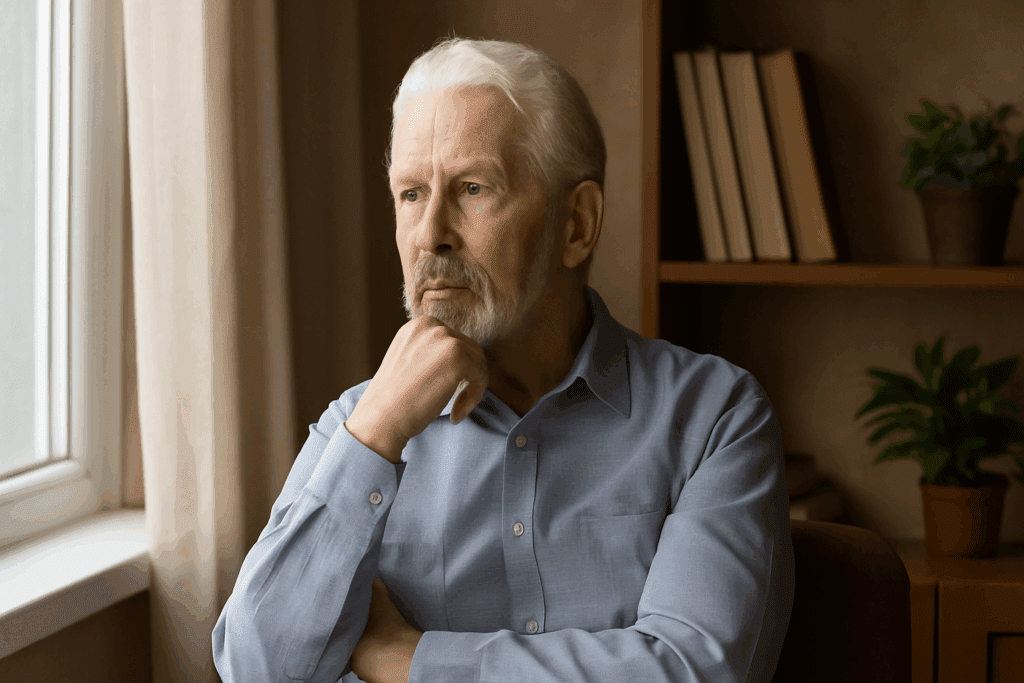
Understanding Mental Health Challenges in Older Adults
Mental health concerns among older adults are more common than many people realize, but they are often underreported and underdiagnosed. Depression, for example, is not a normal part of aging, yet it affects approximately 7 million Americans over the age of 65. Anxiety disorders, though less often discussed, also remain prevalent in this age group. These conditions may be exacerbated by physical ailments, bereavement, reduced mobility, and the gradual loss of independence. Furthermore, societal stigma around mental health issues can discourage older adults from seeking help. Cognitive decline, including mild cognitive impairment and early stages of dementia, adds another layer of complexity, often intersecting with emotional health in profound ways. By addressing these challenges through natural means, old adults may experience improvements not only in mental clarity but in their emotional and spiritual lives as well.
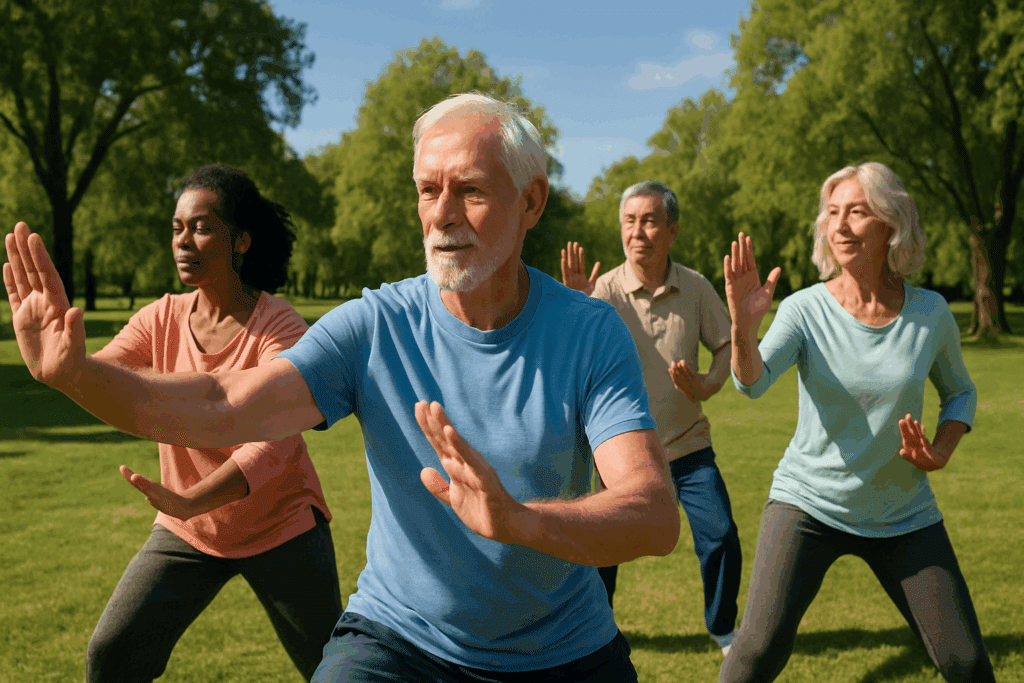
The Role of Physical Activity in Enhancing Cognitive and Emotional Health
One of the most extensively researched natural interventions for mental health in older adult populations is regular physical activity. Exercise stimulates the production of endorphins and brain-derived neurotrophic factor (BDNF), both of which play key roles in mood regulation and neuroplasticity. Walking, tai chi, yoga, and swimming are especially effective forms of movement for old adults, as they offer cardiovascular benefits without placing undue stress on joints. Moreover, physical activity promotes better sleep patterns, enhances energy levels, and fosters a sense of autonomy. Recent studies indicate that consistent movement can delay the onset of cognitive decline, reduce symptoms of anxiety, and even improve executive functioning in older individuals. The social aspect of group exercise classes also supports emotional resilience by fostering community engagement and reducing feelings of isolation.

Nutrition and the Mind: How Diet Shapes Emotional and Cognitive Wellness
The connection between food and brain health is no longer speculative; it is now a well-established pillar of mental wellness. For older adults, nutritional choices can significantly influence both mood and cognition. Diets rich in omega-3 fatty acids, antioxidants, B-vitamins, and polyphenols support optimal brain function and reduce inflammation, which is often implicated in mental health disorders. The Mediterranean and MIND diets, for instance, have been linked to slower cognitive decline and lower rates of depression in aging populations. Nutritional psychiatry, an emerging field, continues to underscore the therapeutic potential of certain foods. Old adults who increase their intake of leafy greens, berries, whole grains, legumes, and fatty fish often report better mood stability and improved memory retention. In contrast, processed foods, high-sugar snacks, and trans fats are associated with increased risk for depression and impaired cognition.
Sleep Quality and Its Impact on Aging Minds
Sleep is not merely a restorative process; it is a vital component of mental health and neurological repair. For older adults, sleep disturbances are all too common, often resulting from changes in circadian rhythm, medical conditions, or medication side effects. However, inadequate sleep is not a harmless inconvenience. It can exacerbate depression, increase irritability, impair memory, and elevate the risk of developing neurodegenerative disorders. Fortunately, a range of natural strategies can enhance sleep quality in aging populations. Sleep hygiene techniques such as establishing a consistent bedtime, avoiding caffeine and screen exposure in the evening, and engaging in calming pre-sleep routines have demonstrated positive effects. Herbal remedies like chamomile or valerian, as well as mindfulness meditation practices, may also promote more restful sleep. As the science suggests, addressing sleep quality can provide older adults with a powerful tool for protecting their mental and cognitive health.
Social Engagement as a Buffer Against Depression and Cognitive Decline
Human beings are fundamentally social creatures, and this reality does not diminish with age. On the contrary, for older adults, maintaining social bonds can be one of the most important natural strategies for preserving emotional and cognitive well-being. Numerous studies have shown that social isolation increases the risk of depression, anxiety, and even premature mortality. Engaging in meaningful relationships, volunteering, participating in community activities, or joining peer groups can enhance a sense of purpose and belonging. These activities help stimulate the brain, encourage emotional expression, and provide opportunities for laughter and joy—all of which are essential for mental health. Old adults who feel socially connected also tend to report higher levels of self-esteem and a greater sense of control over their lives. In this context, the natural antidote to emotional decline is not pharmacological but interpersonal.
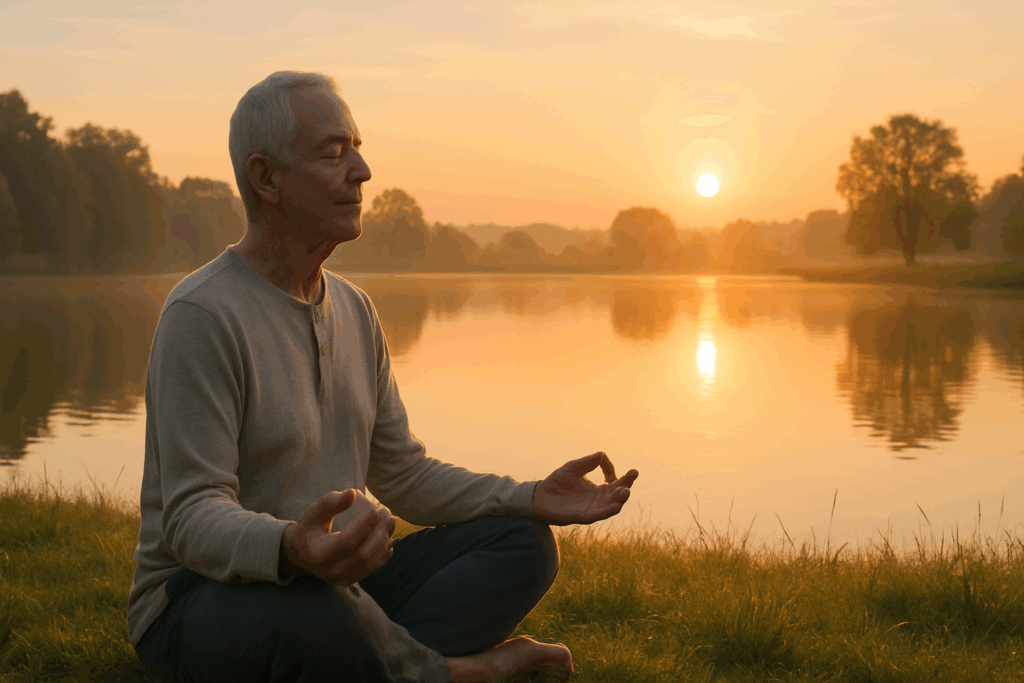
Mindfulness, Meditation, and Stress Reduction
Mindfulness and meditation are increasingly recognized as powerful tools for emotional regulation and cognitive preservation. Rooted in ancient traditions but validated by modern neuroscience, these practices help older adults manage stress, reduce anxiety, and improve focus. Functional MRI studies have shown that mindfulness meditation can enhance activity in the prefrontal cortex, a brain region involved in attention and executive function, while reducing activity in the amygdala, which governs fear and stress responses. For older individuals, regular meditation can cultivate emotional balance and decrease rumination, a cognitive pattern often associated with depression. Importantly, these practices do not require advanced training or physical agility; even brief daily sessions can yield significant mental health benefits. In many community centers and senior programs, guided meditation classes are now offered as part of holistic wellness initiatives, further reinforcing the idea that natural practices can provide powerful support for psychological well-being in old age.
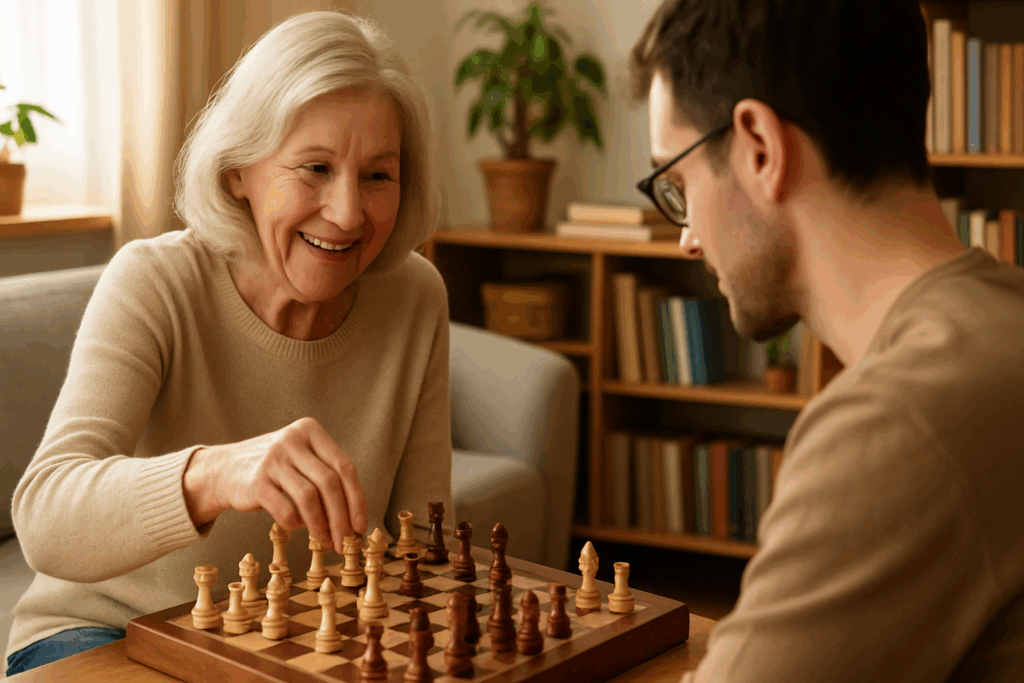
Cognitive Training and Mental Stimulation
The notion that the brain is malleable well into old age has transformed the landscape of cognitive health. Neuroplasticity, the brain’s ability to form and reorganize synaptic connections, does not vanish with time; it can be cultivated through deliberate mental exercise. Cognitive training programs, whether app-based or community-led, have demonstrated success in enhancing working memory, processing speed, and reasoning skills in older adults. Activities like puzzles, learning a new language, playing a musical instrument, or engaging in strategic games such as chess can foster mental agility and ward off cognitive decline. Importantly, these activities are not just about entertainment. They provide structured stimulation that challenges the brain and promotes ongoing learning. When paired with physical activity and social engagement, mental stimulation serves as a cornerstone of a multifaceted approach to cognitive preservation in aging populations.
Spirituality, Purpose, and Psychological Resilience
For many older adults, spirituality becomes a more prominent part of life, offering a framework for meaning, acceptance, and emotional grounding. Whether expressed through religion, philosophical contemplation, or personal reflection, a sense of spiritual connection can enhance resilience in the face of adversity. Numerous studies have found that individuals with a strong sense of purpose experience lower levels of depression, better physical health, and even longer lifespans. Purpose-driven living motivates engagement, fosters optimism, and supports the belief that one’s life continues to have value, regardless of age. This belief, in turn, contributes to psychological stability and reduces feelings of helplessness that can accompany aging. Cultivating purpose might involve mentoring younger generations, contributing to charitable causes, or pursuing long-held personal goals. These activities remind old adults that their presence matters, thereby bolstering both mental health and social contribution.
Reducing Dependence on Pharmaceuticals through Holistic Approaches
Pharmaceutical treatments for depression, anxiety, and cognitive decline can be beneficial, especially in severe cases, but they also come with side effects and risks, particularly in older adults who may already be managing multiple medications. Polypharmacy can lead to adverse interactions, increased fall risk, and diminished quality of life. For this reason, many health professionals advocate for integrative approaches that combine traditional medical oversight with natural, evidence-based practices. By incorporating movement, nutrition, mindfulness, and social engagement into daily life, old adults can often reduce their reliance on psychotropic drugs. This does not imply a wholesale rejection of medication but rather an emphasis on empowering individuals with non-pharmacological tools that support sustainable wellness. Importantly, any changes to medication should be made under medical supervision to ensure safety and continuity of care.
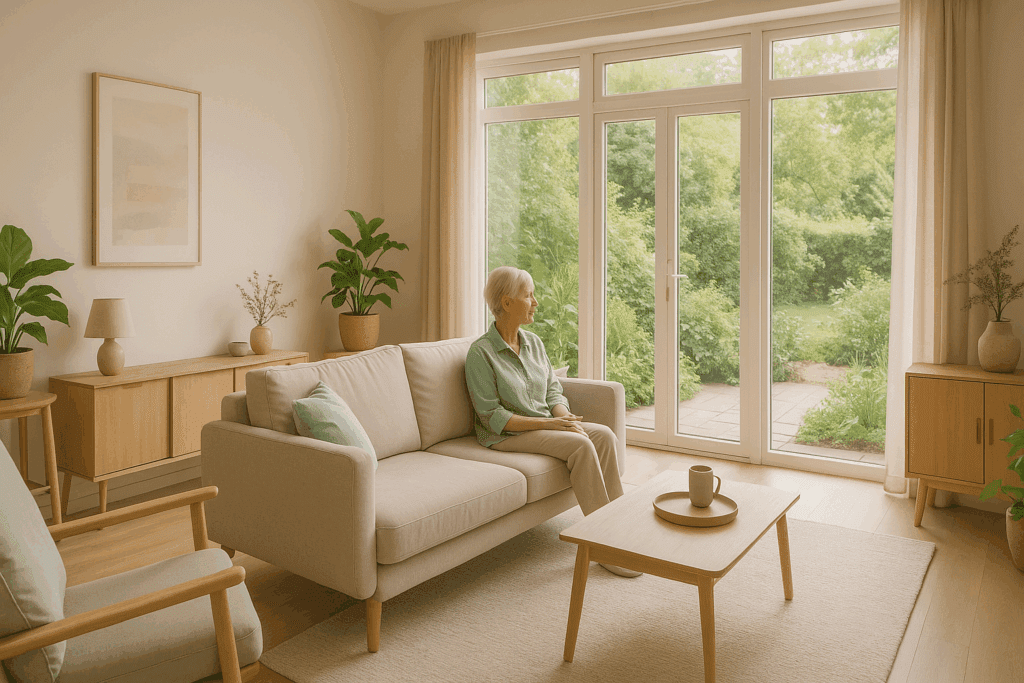
Environmental and Lifestyle Design for Mental Clarity
The physical environment in which older adults live can greatly influence their psychological health. Cluttered, poorly lit, or noisy environments may contribute to confusion, stress, and agitation, particularly for those with cognitive impairment. Conversely, thoughtfully designed living spaces that include natural light, calming colors, safe walkways, and accessible social areas can promote tranquility, autonomy, and interaction. Gardening, for example, is both a form of physical activity and a deeply therapeutic connection to nature. Time spent in green spaces has been associated with reduced cortisol levels and improved mood. Integrating these environmental considerations into daily life can make a profound difference in how older adults experience their surroundings. Design is not merely aesthetic; it is a tool for fostering mental clarity and emotional stability.
Addressing Cultural Attitudes Toward Aging and Mental Health
Cultural perceptions of aging deeply shape how mental health is understood and managed in older populations. In societies where aging is viewed negatively, older adults may internalize beliefs of decline and disengagement, thereby increasing the risk of depression and social withdrawal. By contrast, cultures that revere elders and emphasize intergenerational connection often see better mental health outcomes among their aging populations. Shifting societal narratives to celebrate the wisdom, experience, and continuing contributions of older adults can have far-reaching psychological benefits. Public health campaigns, community programming, and media portrayals all have roles to play in reshaping these perceptions. When older individuals are seen as valuable, active members of society, their mental well-being is not only protected but enriched.
Empowering Caregivers and Community Support Networks
Supporting the mental health of older adults is not an individual task alone; it involves families, caregivers, communities, and health systems working in unison. Educating caregivers about the unique psychological needs of aging individuals helps to prevent burnout, improve empathy, and promote better care outcomes. Community resources such as adult day programs, support groups, and telehealth counseling can extend these benefits, especially in underserved areas. For many older adults, simply having someone to talk to—whether a trained therapist, a family member, or a peer—can make an enormous difference in mental outlook. Investing in these support structures is both a public health imperative and a moral one, ensuring that old adults receive the respect, attention, and emotional care they deserve.
Embracing Aging with Vitality and Emotional Balance: A Natural Path Forward
Growing older need not mean a diminishing of the mind or spirit. On the contrary, the later years of life can be a time of remarkable self-discovery, intellectual growth, and emotional richness—especially when supported by natural, holistic strategies. Research strongly suggests that older adults can improve mental health naturally through intentional changes in diet, movement, social connection, mindfulness, sleep hygiene, and environmental design. These strategies are not merely complementary; they form a cohesive and empowering framework for aging well. When combined, they can enhance resilience, elevate mood, and sharpen cognitive function without overreliance on pharmaceuticals. The collective evidence underscores a hopeful message: mental and emotional vitality are well within reach for older individuals, especially when communities, caregivers, and health systems support integrative, person-centered approaches. As our societies continue to age, embracing these natural pathways will not only enrich individual lives but redefine what it means to grow old with grace, purpose, and joy.
Frequently Asked Questions: Enhancing Mental Health Naturally in Older Adults
1. What role do microhabits play in improving mental health for older adults?
Microhabits—small, manageable changes in behavior—are increasingly recognized as powerful tools for mental health, especially among older adults. These include brief daily practices like a five-minute gratitude journal, a short walk at the same time each day, or taking three deep breaths before meals. For old adults, microhabits are particularly valuable because they are easy to adopt without overwhelming the individual, which is crucial for sustaining long-term wellness. Moreover, small wins can improve mood and foster a sense of control, both of which contribute to better emotional regulation. As researchers suggest, when older adult populations engage in consistent microhabits, even subtle changes can lead to meaningful shifts in mental clarity and overall well-being.
2. Can older adults benefit from digital mental health tools, and are they accessible to all?
Yes, older adults can benefit significantly from digital tools such as mood tracking apps, guided meditation platforms, and virtual therapy sessions. Contrary to the stereotype that older individuals shy away from technology, many older adult users are adapting quickly when proper support is provided. These tools are especially valuable for old adults living in rural or isolated areas, where in-person services may be limited. Accessibility remains a challenge, but simplified user interfaces, larger fonts, and voice commands have improved usability for older populations. With the right guidance, digital resources can serve as effective supplements—not replacements—to traditional mental health care for older adults.
3. How do creative outlets influence cognitive resilience in old adults?
Creative expression through art, music, dance, or storytelling has been shown to stimulate multiple areas of the brain and improve neuroplasticity in older adults. These activities are not just leisure pursuits; they contribute to psychological growth and resilience, particularly when old adults are coping with grief, identity transitions, or physical limitations. Engaging in creativity provides a non-verbal channel for emotional processing, often revealing internal insights that structured therapy might miss. Importantly, when an older adult feels creatively engaged, it reinforces a sense of purpose, mastery, and autonomy—key elements of emotional health. Long-term participation in the arts has even been linked to reduced dementia risk and improved quality of life.
4. Can older adults develop new emotional regulation strategies later in life?
Absolutely. While it’s a myth that personality traits are fixed in old age, research shows that older adults can cultivate emotional intelligence and adapt new coping skills. With age often comes the capacity for greater perspective-taking and emotional nuance. Cognitive-behavioral techniques, mindfulness, and narrative therapy are particularly effective at helping old adults reframe past experiences and manage current stressors. This adaptive capacity is crucial because older adult populations frequently encounter unique emotional challenges, such as loss, illness, or major life transitions. With appropriate support, older adults can enhance their emotional flexibility just as much as younger populations—if not more.
5. What social innovations are helping improve mental health outcomes for older adult populations?
Innovative community models like “villages” or intergenerational housing initiatives are making a noticeable impact on mental health outcomes for older adults. These programs are designed to foster community engagement and reduce isolation by promoting shared responsibilities, group activities, and social bonding. In one such model, old adults live alongside younger people in co-housing units where mutual mentorship occurs, helping to bridge generational divides. Programs like these acknowledge that older adult well-being is intrinsically tied to meaningful social interaction and participation. By encouraging social innovation, we create environments where older adults can thrive emotionally and socially in ways traditional senior housing may not offer.
6. Can older adults use nature therapy as a structured approach to mental wellness?
Nature therapy, also called ecotherapy, involves structured interaction with natural environments to improve emotional and psychological health. For older adults, this can include gardening, forest bathing, or even mindful walking in local parks. Studies show that even moderate exposure to natural settings can reduce cortisol levels and improve attention spans among old adults, particularly those with early cognitive decline. The key is intentionality—ensuring that time in nature is not just passive but involves reflective engagement, which older adult populations often find both calming and invigorating. Importantly, nature-based interventions are accessible, low-cost, and scalable across diverse communities.
7. How does gut health influence mental wellness in old adults beyond diet alone?
Emerging research in the gut-brain axis reveals that microbial diversity plays a pivotal role in mood and cognition, especially for older adults. While diet is essential, additional factors like antibiotic use, chronic stress, and reduced mobility can also alter gut flora in older individuals. Strategies such as probiotics, fermented foods, and stress reduction exercises can help restore balance in the microbiome. For the older adult seeking non-pharmaceutical interventions, gut health offers a promising frontier with tangible mental health benefits. New clinical trials are even exploring how prebiotics and microbiome-targeted therapies can complement psychological care for old adults experiencing anxiety or depression.
8. Can older adults rewire negative self-perceptions about aging through mental health work?
Yes, older adults can and often do reshape internal narratives around aging, especially when supported by affirming mental health practices. Cognitive reframing techniques, life review therapy, and group counseling sessions focused on ageism awareness can help old adults challenge societal stereotypes. When an older adult is encouraged to see aging as a stage of contribution and reflection, it can foster pride, reduce shame, and reinforce self-worth. Mental health practitioners increasingly emphasize the psychological impact of age-based stigma and advocate for therapeutic spaces that validate the evolving identity of old adults. This shift in perspective is essential for cultivating confidence and emotional vitality later in life.
9. How does spirituality intersect with mental resilience in diverse older adult populations?
Spirituality often serves as a deeply personal and adaptive resource in the lives of older adults, contributing to psychological resilience across cultural backgrounds. For many, spiritual practices provide a framework for making sense of life events, facilitating emotional release and acceptance. In multicultural aging populations, spirituality can take numerous forms—from traditional religious rituals to secular mindfulness practices or ancestral heritage celebrations. The ability to draw strength from these practices allows old adults to confront mortality, cope with grief, and sustain hope. Clinical settings that integrate spiritual assessments often see better therapeutic outcomes for older adult patients navigating major life transitions.
10. Can older adults influence public policy to better support mental health in aging populations?
Certainly, older adults are increasingly involved in shaping local and national policies that affect mental health services, accessibility, and aging equity. Through advocacy groups, town hall participation, and advisory boards, older adults are voicing their needs and proposing reforms. In many municipalities, older adult councils are being formed to ensure that mental health strategies reflect the lived experiences of aging individuals. Their input is critical for developing age-friendly infrastructure, expanding telehealth, and funding community-based wellness programs. The empowerment of old adults in the policy space underscores a broader cultural shift—one that recognizes older populations not only as recipients of care but as influential agents of change.
Conclusion: Natural Solutions for Emotional and Cognitive Wellness in Older Adults
The journey of aging, though accompanied by undeniable changes, can also unfold as a deeply enriching chapter marked by resilience, insight, and renewed purpose. As scientific research continues to highlight the intricate connections between lifestyle and mental health, it becomes increasingly clear that older adults possess both the capacity and the opportunity to improve emotional well-being and cognitive clarity through natural, evidence-based strategies. Whether it’s nourishing the brain through targeted nutrition, reinforcing cognitive agility with regular mental challenges, or cultivating serenity through mindfulness and sleep routines, these practices empower older adults to play an active role in their mental wellness. Importantly, fostering social connection, nurturing a sense of purpose, and designing supportive environments help transform these individual efforts into sustainable, community-driven well-being.
The question isn’t simply whether older adults can enhance their mental health—it’s how society can empower them to do so with dignity, knowledge, and support. By recognizing the value of holistic health, we not only affirm the worth of each older adult but also create a more compassionate and inclusive culture that honors the full spectrum of human life. As families, caregivers, practitioners, and policymakers, we must elevate these natural strategies as essential tools in aging with clarity, connection, and joy. The future of aging lies not in limitation, but in possibility—and that future begins with the informed choices we make today.
Further Reading:
Cognitive Health and Older Adults
Cognitive and neuroscientific perspectives of healthy ageing


